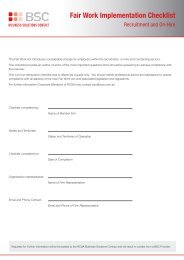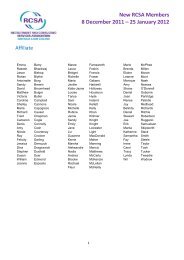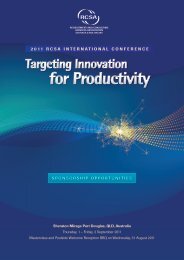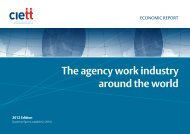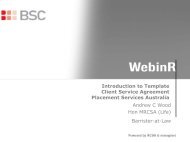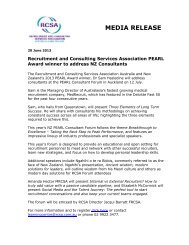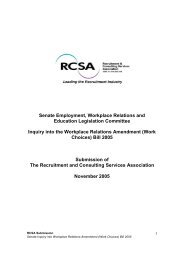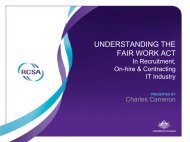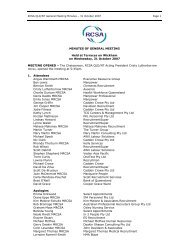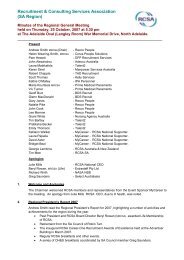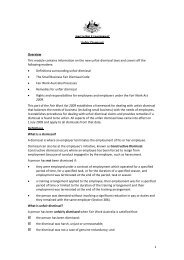June 2012.pdf - RCSA
June 2012.pdf - RCSA
June 2012.pdf - RCSA
You also want an ePaper? Increase the reach of your titles
YUMPU automatically turns print PDFs into web optimized ePapers that Google loves.
BUSINESS MANAGEMENT ISSUES<br />
Discussion Paper<br />
Flexibility, change and economic growth:<br />
the role of on-hire agency work in<br />
Australia’s labour market<br />
Today’s economy is fastmoving,<br />
dynamic and<br />
subject to rapid change.<br />
The ability of workers and<br />
businesses to predict, and<br />
respond to, these economic<br />
conditions, is increasingly<br />
limited. Therefore, both<br />
workers and businesses<br />
need as much help as<br />
possible to rapidly adjust<br />
to market conditions and<br />
personal circumstances.<br />
Recruitment firms play a<br />
central role in providing<br />
this flexibility to workers<br />
and businesses alike.<br />
Australian workers are adapting to<br />
change and are increasingly able to<br />
understand that it is not possible for<br />
Australia to row against the tide of global<br />
economic uncertainty. The concept of a job<br />
for life is, to most Australians, unrealistic and,<br />
increasingly, undesirable. These are the<br />
people who make up the contemporary<br />
Australian workforce, where flexibility flows<br />
both ways.<br />
Despite the important role of adaptive<br />
“agency” work, this model of employment<br />
is under fire for failing to provide “secure”<br />
work. The Australian Council of Trade<br />
Unions’ (ACTU) Secure Work campaign<br />
seeks to provide protection for the “forty per<br />
cent of workers [who] are engaged in insecure<br />
work arrangements such as casual work,<br />
fixed term work, contracting or labour hire”.<br />
And therein lies the problem: the union<br />
campaign sweeps non-traditional work of<br />
every type into one large bundle. It assumes<br />
highly-paid IT contractors, for example, are<br />
in the same position as minimum-wage<br />
casual cleaning staff.<br />
Nobody denies that some insecure jobs<br />
exist, and that this form of employment does<br />
not suit all individuals involved. But labelling<br />
all non-traditional work models as “insecure”,<br />
in a negative sense, simplifies the issue until<br />
it loses any meaning. It takes a complex and<br />
multi-layered workforce model, then lumps<br />
it all under the emotive but misleading name<br />
of “insecure work”.<br />
Adaptive agency work is a valid and<br />
important part of the modern economy;<br />
rather than pushing for its end, we should<br />
be working collaboratively to ensure those<br />
who need to adapt to changing personal<br />
circumstances and lifestyle needs are able<br />
to, and those who genuinely need protection<br />
are afforded this.<br />
This paper discusses the role of recruitment<br />
firms in helping businesses and government<br />
to adapt, and provide decent work for<br />
individuals, while contributing to economic<br />
growth and international competitiveness.<br />
It also looks at the role of the recruitment<br />
industry in supporting workers in this sector.<br />
An adaptive workforce: key to<br />
economic growth<br />
The International Confederation of Private<br />
Employment Agencies (CIETT) and Boston<br />
Consulting Group (BCG) recently launched<br />
a global report that shows countries with<br />
agile work models and reasonable regulation<br />
outperform those with heavy regulation and<br />
little flexibility, in terms of both economic<br />
and labour market performance.<br />
Moreover, it shows that private employment<br />
agencies deliver decent work to individuals,<br />
and help match and develop the skills needed<br />
in labour markets. For example, one of the<br />
largest recruitment agencies in the country<br />
is also one of the biggest employers of<br />
apprentices.<br />
Almost 1 in 3 Australian<br />
employers use temporary<br />
staff from recruitment<br />
agencies to manage skills<br />
shortages<br />
Adecco Temporary Labour Report 2012<br />
Flexible work: sorting myth from fact<br />
The outcome of an over-regulated, inflexible<br />
work model isn’t more secure jobs for people<br />
– it’s fewer jobs overall.<br />
The use of flexible or contingent workforces<br />
is an important part of the modern business<br />
landscape, allowing employers to respond<br />
to a rapidly changing environment. In fact<br />
76 per cent of employers use recruitment<br />
agencies to respond more quickly to<br />
business demands.<br />
With volatility becoming a fixture of the<br />
economic system, employers, therefore,<br />
need to remain responsive. This doesn’t<br />
spell doom for employees however; they<br />
have the ability to remain agile too, building<br />
transferable skills that allow them to move<br />
when the market does.<br />
Ultimately, businesses make a choice about<br />
their growth plans, and that often involves a<br />
flexible and scalable workforce. For the<br />
majority of employers, it’s not a choice of<br />
“hire permanent staff or hire temporary staff”.<br />
It is, in fact, “hire temporary staff, or don’t<br />
hire at all”.<br />
RMIT University research found that<br />
51 per cent of organisations using on-hired<br />
employees would not necessarily employ an<br />
equivalent number of employees directly if<br />
they were unable to use on-hired employees.<br />
In fact 19 per cent of organisations said they<br />
would rarely do so.<br />
24<br />
<strong>RCSA</strong> JOURNAL



